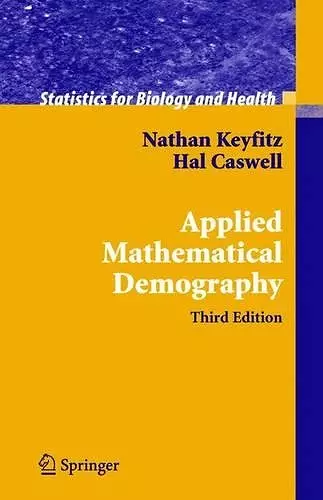Applied Mathematical Demography
Nathan Keyfitz author Hal Caswell author
Format:Hardback
Publisher:Springer-Verlag New York Inc.
Published:14th Jan '05
Currently unavailable, and unfortunately no date known when it will be back
This hardback is available in another edition too:
- Paperback£119.99(9781441919779)

3rd edition
Focuses on applications of demographic models, extending to matrix models for stage-classified populations. This book introduces the life table to describe age-specific mortality, and develops theory for stable populations and the rate of population increase. It also introduces reproductive value and the stable equivalent population.ButIacceptedtheinvitation.Key?tz'ssuggestionthatweincorporatesome of my earlier work on matrix population models seemed like a good way to complement the methods presented in the book, and to expand the range of their applications. I am a demographer of plants and nonhuman animals. Some would call this an oxymoron, since the Greek rootdemos refers to people, and that's us. But there are precedents for taking more inclusive de?nitions of the Greek.Ecologyandeconomics,forexample,bothcomefromtherootoikos, referring to the household. Interpretingdemos as referring to individuals, whether they are persons or not, lets demography apply across species. There is a long tradition of such crossover. Alfred J. Lotka is acknowledged as a founding father of both demography and ecology. Raymond Pearl used demographic methods to analyze the e?ects of toxic substances and cro- ing on fruit ?ies. Lee (1987) compared the density-dependence of the vital rates of human and non-human animals. Today, in studies of senescence, reproduction, and individual heterogeneity, the boundaries between animal and human studies are becoming increasingly blurred (Wachter et al. 1997, Carey 2003, Wachter and Bulatao 2003, Carey and Tuljapurkar 2003).
From the reviews of the third edition:
"If you found the original editions...to be excellent (and who amoung us has not?) then you will find the new edition to be equally so...This book is highly and unreservedly recommended for any beginning mathematical demographer." Mathematical Population Studies, 12:223-228, 2005
"The material in the second edition is retained, although the chapters are reorganized and references are updated. New chapters focusing on matrix population models are seamlessly interwoven with the second edition chapters, resulting in a thorough and comprehensive treatment of human, animal, and nonhuman demography." Journal of the American Statistical Association, December 2005
"The extension from the preceding editions does illustrate well, how demography in general has branched from plain presentations of human life tables into three directions … . The reviewer strongly recommends the book … . demography never has been as important as today. This presentation of techniques (e.g. simple integrations, statistics, straightforward calculation) is essentially simple and powerful and simultaneously well accessible to economists and political scientists. By this book the reader will understand the force of demographic facts and ideas." (Götz Uebe, Allgemeines Statistisches Archiv, Vol. 89, 2005)
"The present one is considerably enriched by the contribution of the second author, who is a demographer of plants and nonhuman animals. … the book is of interest not only to demographers, but to any scholar interested in biology. The book is organized in 20 chapters, a Bibliography of almost 700 entries and an index." (Solomon Marcus, Zentralblatt MATH, Vol. 1104 (6), 2007)
ISBN: 9780387225371
Dimensions: unknown
Weight: unknown
558 pages
Third Edition 2005